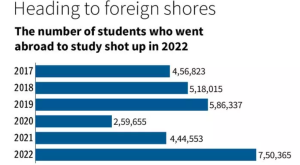Example of a Typical Application Error
A common mistake is failing to submit supporting documents, such as transcripts or proof of enrollment, within the stipulated timeframe. This omission could lead to the application being rejected. Another frequent error is submitting incomplete or inaccurate financial information. Carefully review the specific requirements for each loan program and ensure that all requested information is correctly provided.
Following these steps will significantly increase the likelihood of a successful application.
Important Considerations

Understanding government education loans for studying abroad involves more than just the application process. Careful consideration of the loan terms, financial implications, and available resources is crucial for a successful and manageable experience. Students must be prepared for the long-term commitments and associated responsibilities that come with these loans.
Understanding Loan Terms and Conditions
Thorough comprehension of the loan’s terms and conditions is paramount. This includes the interest rates, repayment schedules, and any associated fees. Students should meticulously review all documents, seeking clarification on any ambiguous points with the lending institution. Understanding the repayment terms will help in creating a realistic budget and avoid potential financial strain in the future. A detailed understanding of the loan’s terms ensures a clear understanding of the borrower’s obligations and rights, which is crucial for avoiding any unforeseen issues during repayment.
For example, understanding the grace period and any penalties for late payments is vital. A common pitfall is failing to understand the compounding effect of interest, which can significantly impact the overall cost of the loan.
Credit History and Financial Stability
Credit history and financial stability play a significant role in loan approval. A strong credit history, demonstrating responsible financial management, generally increases the likelihood of loan approval and potentially favorable terms. Demonstrating financial stability, through documentation of income and assets, further strengthens the applicant’s position. Lenders assess the applicant’s ability to repay the loan, considering their current financial obligations and projected income.
Lenders often consider a student’s ability to manage financial commitments alongside their studies, reflecting their overall financial responsibility.
Essential Resources for Students
Navigating the loan application process can be complex. Students should utilize available resources to gain a better understanding of the application requirements, procedures, and available options. Government websites, financial aid offices at educational institutions, and independent financial advisors can provide valuable support. These resources can help students navigate the application process, understand eligibility requirements, and compare loan options.


